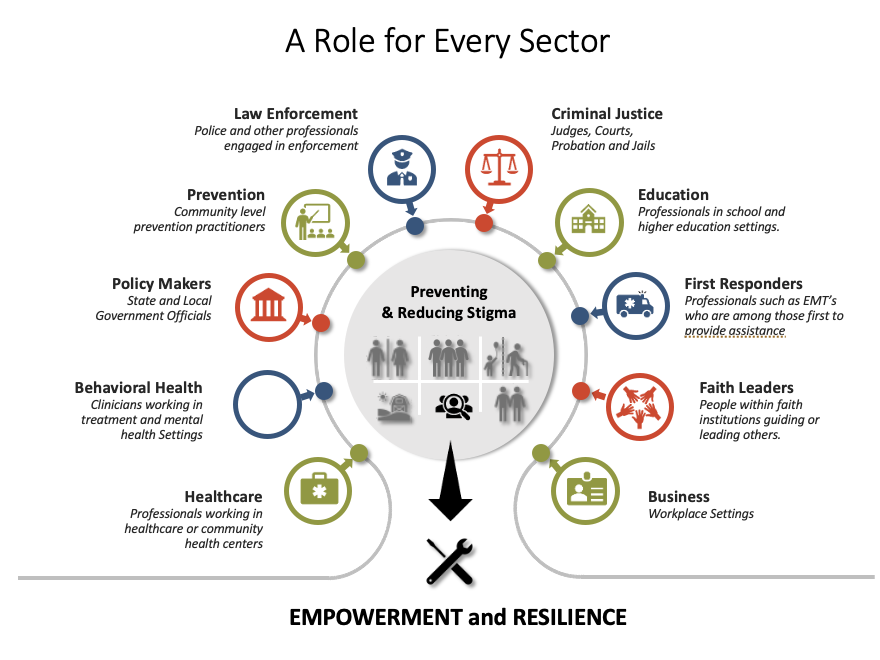Home > Preventing and Reducing Stigma in Community Sectors

Stigma disproportionately influences health outcomes and mental well-being for individuals with mental health or substance use disorder (SUD).
Fear of being judged and/or discriminated against can prevent people from getting the help they need. Stigma is complex due to various societal and research definitions, including the fact that it comes in many different forms. Stigma is not limited to one setting or condition; rather, it is cross-cutting in all communities and populations.
The best approach to stop or prevent stigma is through cross-cutting practices such as:
Click the links below to read more about the impact of stigma in specific community sectors, actions to take to reduce stigma in each sector, and related research. Each page includes a link to a slide deck designed for anti-stigma education and outreach activities.
Behavioral Health
Mental health and substance use disorders (SUD) are among the most common chronic health conditions in the United States. The National Survey on Drug Use and Health reports that 61.2 million American adults—almost one in five—experienced either an SUD or any mental illness in 2019.
Business
People with mental health and SUD experience high rates of discrimination in employment. Discrimination in employment can be subtle, and few protections exist for individuals with substance or mental health disorders.
Criminal Justice
People with mental health and SUDs are overrepresented in the criminal justice system. More than half of all inmates in the U.S. have a mental illness. Individuals with mental illness are more likely to experience multiple arrests and incarcerations.
Education
Depression, anxiety, attention-deficit hyperactivity disorder (ADHD), and bipolar disorder are the most common mental health conditions affecting high school students. Staff and faculty are on the front lines when it comes to supporting students who have mental illnesses.
Faith Leaders
Most Americans are part of a religious institution, which is the first point of contact for those seeking help with a mental health or substance use problem. Religious institutions offer support for these individuals in an environment that respects their culture and values, with some studies finding that religious involvement is a protective factor for mental health and substance use.
First Responders
While mental health and SUDs affect people from all walks of life and all age groups, people with these disorders interact disproportionately with members of the police force, fire department, and emergency medical services. Individuals with severe mental illness generate no fewer than 1 in 10 calls for police service.
Healthcare
Since 2016, More than 65,000 Americans have died from overdose deaths in rural and urban communities across the United States. Due to substance use disorder (SUD) morbidities and mortalities, many have sought help from the healthcare system.
Law Enforcement
Law enforcement personnel frequently interact with people with mental illness and SUD because these populations are disproportionately represented in jails and overall within the criminal justice system.
Policy Makers
Prevention
According to the 2017 National Survey on Drug Use and Health, about 8 out of 10 people with a mental health condition reported experiencing shame and stigma that prevented them from seeking treatment.